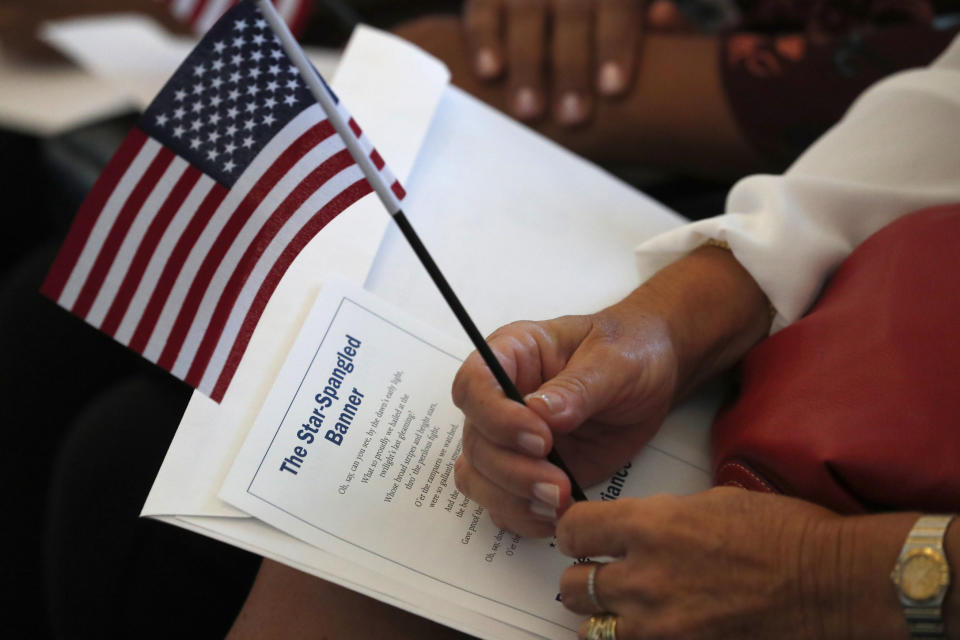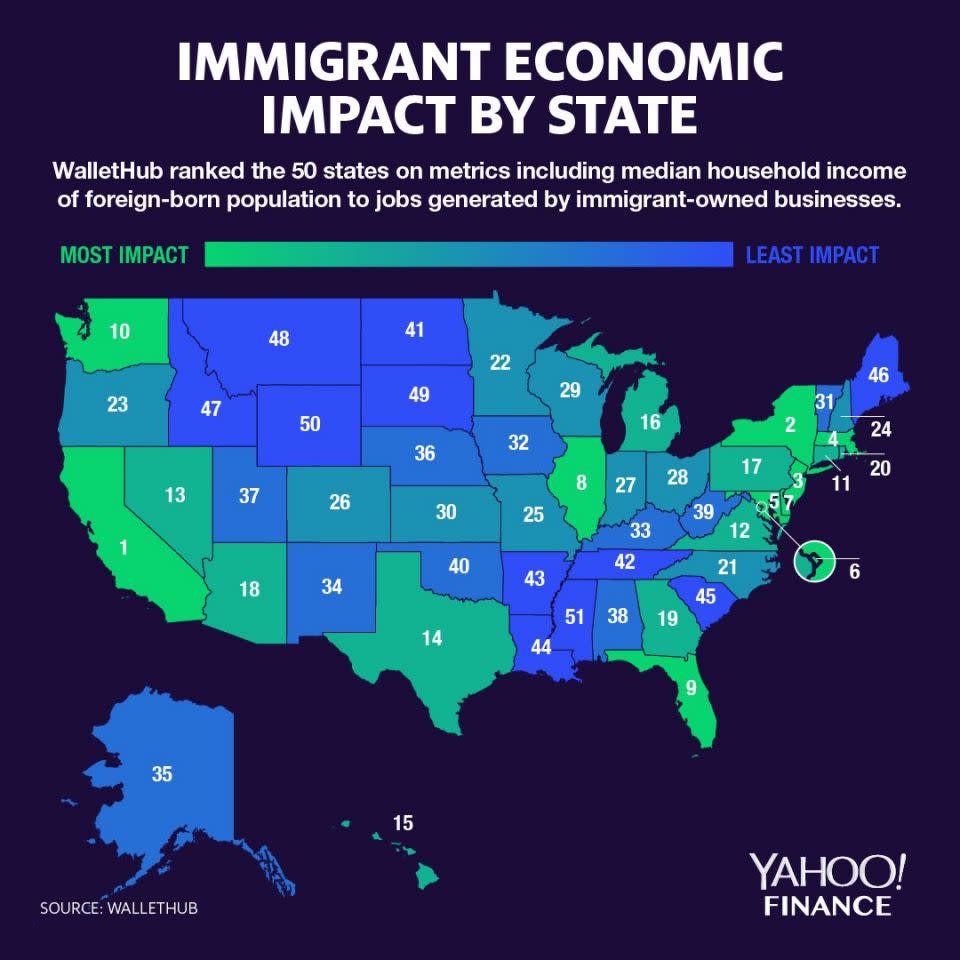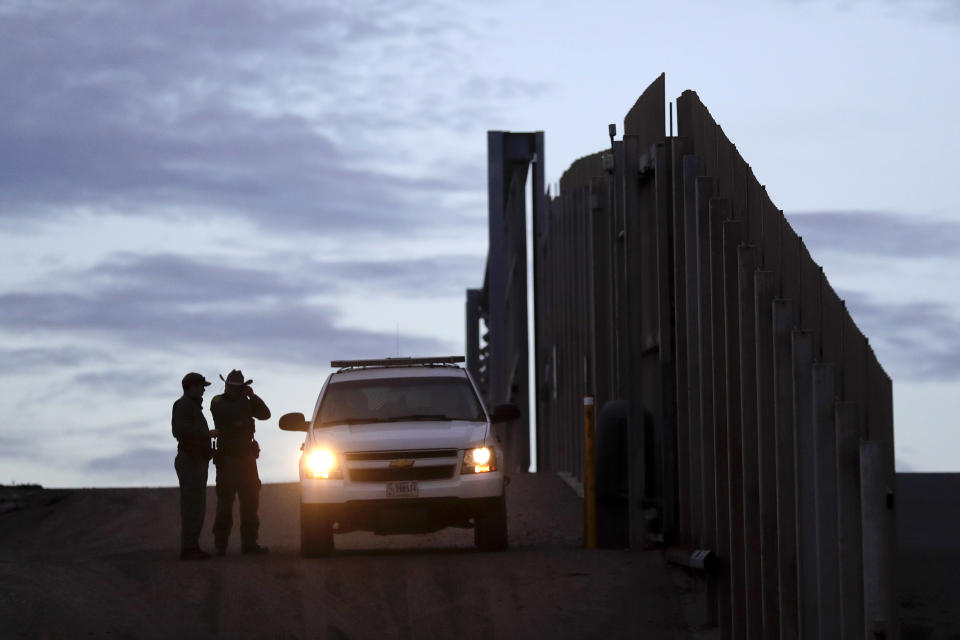New research: The U.S. economy will need more immigrants soon
As the U.S. finds itself entangled in a debate over immigration, research indicates that there are plenty of economic benefits of immigration for the American workforce.
In a policy brief for the Migration Policy Institute, Georgetown University professor Harry Holzer detailed the three major shifts that the U.S. labor market will face over the next few decades — an aging workforce, automation, and alternative staffing — and argued that “increased immigration can provide many benefits to the U.S. economy.”
A Penn Wharton Budget Model (PWBM) policy paper had similar findings, indicating that “the largest positive impact on employment would come from increasing the net flow of immigrants.”
The new research comes as lawmakers continue struggling to find a solution that satisfies all parties while the Trump administration carries out its hardline immigration policies. A June Gallup poll found that 23% of Americans see immigration as the main issue in the country. That poll also indicated that 76% of people view immigration as a good thing in the country and that 43% of Americans think that immigrants are making the overall U.S. economy better.
“From an economic standpoint,” Wharton assistant professor Exequiel Hernandez said, “the research evidence is pretty clear in showing that what’s best for the U.S. economy is to have more immigration.”

‘This is probably the main reason that immigration generally is good’
Holzer wrote that as the native-born population and workforce will age out, that leaves opportunities for racial and ethnic minorities. And with the rise of technology, he predicts a rise in worker displacement rates. The gig economy will play a role as well, as he sees firms relying “more heavily on independent contractors and other forms of outsourced human resource functions.”
Immigration in relation to these shifts will lead to reduced costs.
“This is probably the main reason that immigration generally is good for an overall economy,” he told Yahoo Finance. “It increases the supply of workers in various fields, and often reduces the labor costs in those fields for two reasons. Number one, only some immigrants are willing to work for less than their native-born counterparts. But also, it’s just extra supply, and an extra supply of workers reduces the costs.”
However, Holzer added, these aforementioned reduced costs could potentially lead to reduced wages.
“If the immigrants weren’t there, the wages would likely be rising,” Holzer said. “And that might be better for some of the native-born folks. On the other hand, it puts a big burden on the people that have to pay for that. Consumers tend to be better off when immigrants come in and lower these costs, because lower costs get passed on in the form of lower prices.”

‘Increasing the inflow of immigrants means a bigger consumer market’
U.S. Census data supports the notion that with immigration comes more innovation. Yahoo Finance previously reported on how immigrant-owned tech firms in the U.S. are more innovative than U.S.-born entrepreneur firms. Examples of this include Google (GOOGL), co-founded by former Soviet Union resident Sergey Brin, and Tesla (TSLA), founded and run by CEO Elon Musk, a South African native.
Michael Clemens, a senior fellow and economist at The Center for Global Development, said that the benefits go far beyond innovation.
“Immigration is not just an increase in the supply of workers. It’s also an increase in the supply of consumers,” Clemens told Yahoo Finance. “It’s also an increase in the supply of potential entrepreneurs. It’s an increase in the incentives for innovation in the economy. It’s all of those things at the same time.”
The PWBM paper highlighted how increasing legal immigration can have a major positive impact on GDP, stating that 1.6 million more legal immigrants over the next 35 years would put the average annual GDP growth at 2%.
“Increasing the inflow of immigrants means a bigger consumer market, growing demand for housing, for food, and not only do more people increase demand for existing products, but you also have new markets that get created because immigrants bring new tastes and needs and mix their tastes and needs with local people,” Wharton’s Hernandez said.
A WalletHub study analyzed the economic impact of immigrants by state and found that California, New York, and New Jersey are the states that see it the most.

The Trump administration has somewhat recognized the economic contributions, floating a plan in May to attract highly skilled immigrants who speak English.
Clemens emphasized that even immigrants without “high skills” can still contribute to the U.S. economy.
“What the U.S. economy needs [is] workers that are better matched to employer demand,” Clemens said. “That is not at all just workers with lots of education. The economy is driven by workers with lots of education. It is also driven by fundamental workers who do essential tasks that don’t require a lot of education. Silicon Valley certainly runs on software engineers, but it also runs on child care workers, janitors, security workers, farm workers, construction workers, delivery and warehousing workers, without which none of their businesses would be viable.”
‘They see the immigrants, they tend to blame them’

What many don’t realize, Holzer said, is that automation is causing a bigger shift in the labor market than immigration.
In an executive order regarding artificial intelligence (AI) from February 2019, the White House stated: “The United States must train current and future generations of American workers with the skills to develop and apply AI technologies to prepare them for today’s economy and jobs of the future.”
Presidential candidate Andrew Yang has highlighted this issue as well. During the Democratic debates, he said: “If you go to a factory here in Michigan, you will not find wall-to-wall immigrants; you will find wall-to-wall robots and machines. Immigrants are being scapegoated for issues they have nothing to do with in our economy.”
Holzer agreed.
“I think the reason Trump got elected is that the American working class, especially the white working class, tends to blame trade and immigration for a lot of their woes, more than they should,” he said. “Most economists say automation over time has had a bigger effect than say, imports from China. It’s reducing wages for the working class … [But] they see the immigrants, they tend to blame them.”
Adriana is an associate editor for Yahoo Finance. Follow her on Twitter @adrianambells.
READ MORE:
New U.S. Census data shows that immigrant-owned tech firms are more innovative
Andrew Yang says ‘immigrants are being scapegoated’ — and a new study backs that up
Read the latest financial and business news from Yahoo Finance
Follow Yahoo Finance on Twitter, Facebook, Instagram, Flipboard, SmartNews, LinkedIn, YouTube, and reddit.

 Yahoo Finance
Yahoo Finance 
